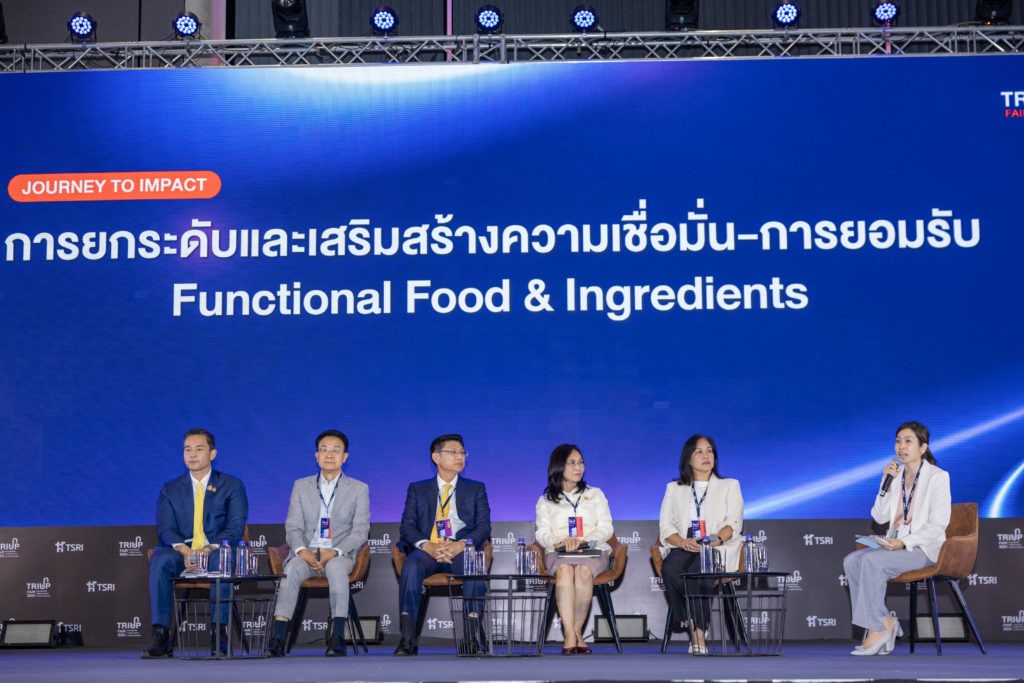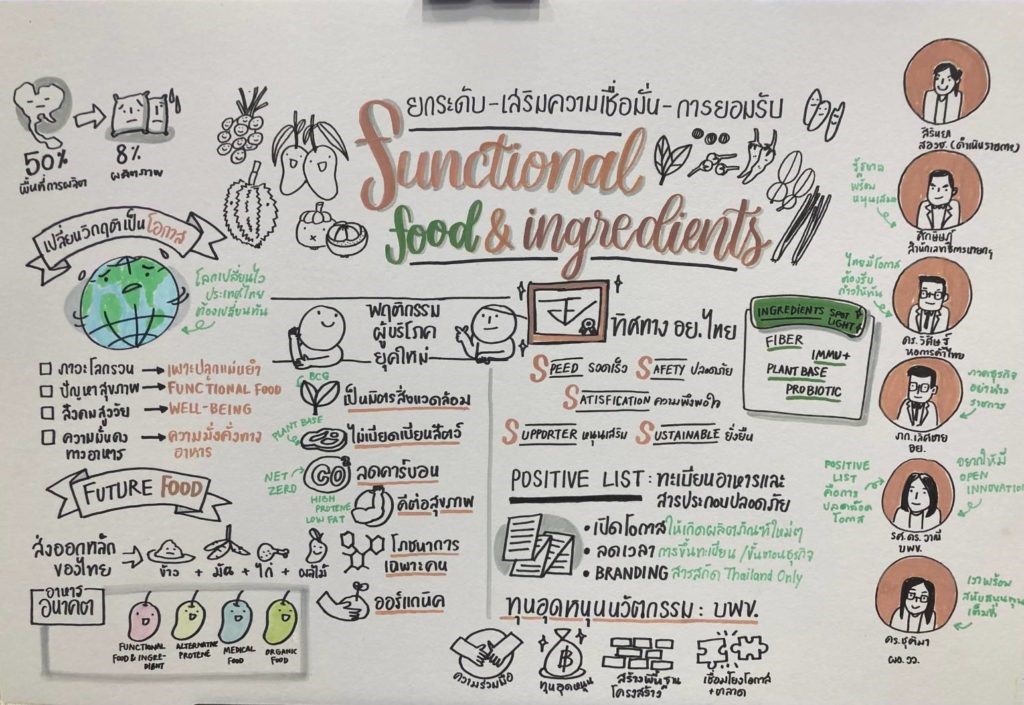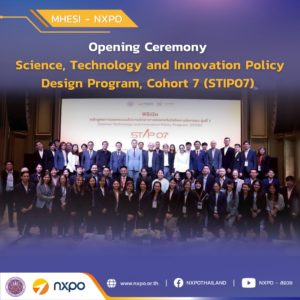
On 24 September 2024, Ms. Sirinya Lim, Senior Division Director of NXPO, moderated a session titled “Journey to Impact: Enhancing Confidence and Acceptance of Functional Food & Ingredients with Science, Research and Innovation (SRI)”. Held as part of the TRIUP FAIR 2024, the session was organized by the Thailand Science Research Innovation (TSRI). Panelists included Mr. Suksit Srichomkwan, former Deputy Secretary-General to the Prime Minister for Political Affairs; Dr. Visit Limlurcha, Vice Chairman of the Thai Chamber of Commerce; Mr. Lertchai Lertvut, Deputy Secretary-General of the Food and Drug Administration (FDA); Dr. Chutima Eamchotchawalit, Governor of the Thailand Institute of Scientific and Technological Research (TISTR); and Assoc. Prof. Dr. Vanee Chonhenchob, Chairperson of the Functional Ingredient and High Valued Agricultural Products and Health Foods Program Board under the Program Management Unit for Competitiveness (PMUC).

Ms. Sirinya Lim highlighted the growing focus on consumer confidence in functional foods and ingredients among Thai researchers and enterprises. As a leading food exporter, Thailand stands to significantly benefit from the emerging future food sector, which promises to add substantial value to the existing food industry. However, the development of functional food and ingredients requires intensive research to ensure consumer confidence and safety.

Mr. Suksit Srichomkwan emphasized that global challenges such as the persistent Russia-Ukraine war and droughts, are impacting food security, affecting both raw materials and food processing. With 25% of Thailand’s workforce employed in the food sector, the government aims to enhance the capabilities of its agriculture, livestock, and high-valued food industries, including halal and functional food. The “Market-Driven, Innovation-Supported, Income-Generating” concept is the government’s core policy for promoting the Thai food industry. “Market-Driven” focuses on aligning production with consumer needs, while “Innovation-Supported” promotes using technology and innovation, such as low-carbon agricultural practices and advanced processing techniques. The government has mechanisms in place to promote quality food products both domestically and internationally and the Ministry of Higher Education, Science, Research, and Innovation (MHESI) should collaborate with relevant agencies to leverage these mechanisms. Moreover, the government is streamlining public services to improve the ease of doing business. Meanwhile, production standards, including traceability, are being integrated into a singple platform to ensure accountability. These efforts aim to position Thailand as a global Food Hub.
“Our funding program should collaborate with international partners, exploring new opportunities and promoting lab-to-market research. Successful commercialization will result in income generation, manifesting research impact,” Mr. Suksit concluded.

Dr. Visit Limlurcha discussed the increasing attention to the future food industry due to its alignment with global trends, particularly well-being, sustainability and innovation. He noted a 24% growth in health food market during the pandemic as consumers prioritized immune-boosting foods. In the first half of 2024, 43% of Thailand’s future food exports went to ASEAN countries, with further growth opportunities in the US, China, the EU27, and the UK. Leading export categories include nutrition foods, such as sauces, seasonings, snacks and dried fruits reformulated for health benefits (e.g., low-sodium, low-sugar, low-fat). Emerging segments include functional drinks, probiotics, alternative proteins (such as soy, oat, and almond milk), and functional ingredients (flavorings, concentrates, essential oils, herbal powders like ginger and turmeric). Dr. Visit emphasized that food security – ensuring sufficient, accessible, and nutritious food -must remain a priority, with businesses needing to stay ahead of consumer trends for effective marketing.

Mr. Lertchai Lertvut outlined the FDA’s 5S core values – Speed, Safety, Satisfaction, Shift, and Sustainability – which drive the agency’s operation. Next year, the FDA will launch the “Triple-A Policy Impact Ignite Thailand: FDA EcPRESSO ABCD” initiative to support the functional food sector by implementing the e-certification system, establishing Positive Lists for health claims, and facilitating business matching, co-creation and development.

Dr. Chutima Eamchotchawalit noted that future food combines global healthcare trends with technological advancements. TISTR has developed a platform to ensure food safety, encompassing good agricultural practices (GAP) to good hygiene practices (GHP) in processing. Developing functional foods can be a lengthy process, as building credibility for high-value products is essential. The FDA’s Positive Lists are expected to shorten this journey, and a Pool Resource approach – where resources are shared – could enhance efficiency.
“In public-private collaborations, businesses demands speed, which can be achieved with integrated databases, open innovation, and information sharing. Clear goals are crucial for effective cooperation,” said Dr. Chutima.

Assoc. Prof. Dr. Vanee Chonhenchob discussed PMUC’s funding program for functional ingredient, high valued agricultural products and health foods which focuses on promoting their production and export potential using local resources and innovations aligned with the BCG concept. PMUC funding aims to close gaps in scaling up production and standardization. Funding has been provided to establish pilot plants, research and testing laboratories, databases, systematic reviews, and promotion publication. PMUC also collaborates with the FDA to enhance enterprise capacity and build consumer confidence and acceptance. Several PMUC-funded products have been launched, with many more in the pipeline. Dr. Vanee stressed
that investment in research and development is vital for Thailand’s competitiveness, not only addressing current needs but anticipating future challenges. She highlighted the importance of a robust innovation ecosystem with strong players in both the public and private sectors and the potential of functional food and ingredients, novel foods, and premium pet food to drive the nation’s economic growth.









